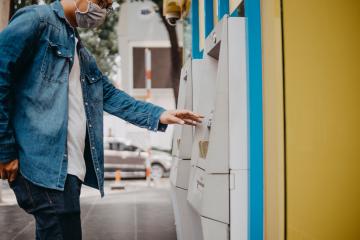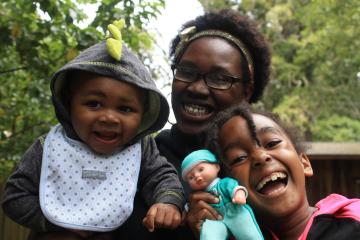
BAE Incubator partner series, part three: Abode Services on rigorous evaluation and elevating community voices

With grant support from Google.org, the Bay Area Evaluation (BAE) Incubator supports Bay Area service providers with implementing and evaluating cash transfer programs to assess their impact on homelessness and housing stability. In part three of our BAE Incubator partner series, Abode Services reflects on their experiences as an Incubator partner. Vivian Wan, chief operating officer, discusses how the Incubator is enabling Abode to expand its impact by elevating the voices of their program participants.
Abode Services was founded in 1987 as an emergency shelter and has grown into one of the California Bay Area’s largest providers of housing for people experiencing homelessness. At the heart of our mission is the firm belief that housing is the solution to end homelessness and that anyone can secure, maintain, and thrive in housing if given the right support.
Abode Services views homelessness as a systemic and structural problem that must be addressed with evidence-based interventions that can be effectively scaled. As such, we are constantly growing and seeking ways to expand our impact. To do so requires both a commitment to the honest assessment of our programs and a willingness to adapt programs when required. Expanding our impact involves investing in evidence-based practices and trying promising new programs. Abode’s partnership with J-PAL North America through the BAE Incubator will enable us to implement a new cash transfer program and assess its impact through a rigorous evaluation.
Cash transfers are a promising solution that could be of tremendous benefit to the people we serve. They are also closely aligned with one of Abode’s core values: self-determination and choice. While services can be a critical component to help people experiencing homelessness find and retain housing, there are still some paternalistic concepts baked into service provision. For example, there’s a common notion that many people are poor or homeless due to their poor choices, and service providers should be making decisions on behalf of their participants. We reject this notion. We believe that people know what is best for themselves and their families and should have the power and resources to make their own decisions. We believe cash transfers, which can empower participants to make their own decisions, can lead to better outcomes. And, in a housing market as formidable as the Bay Area, we believe that cash transfers can greatly improve housing stability and other measures of wellness among the households who receive them.
To test this theory, we are working with J-PAL North America and its affiliated researchers to design a robust impact evaluation. We firmly believe in measuring the effects of our program and understand that randomized evaluations are uniquely positioned to rigorously quantify a program’s impact. In a field where resources are limited and the demand for assistance far outstrips the supply, it is critical to know if and how our programs are working and to ensure that valuable resources are going toward the programs that are most impactful and cost-effective.
A key component of the BAE Incubator is the opportunity to connect with expert researchers in J-PAL’s network to design and potentially carry out a randomized evaluation. J-PAL North America Senior Research Manager Amanda Lee did a wonderful job matching us with researchers at the Wilson Sheehan Lab for Economic Opportunities (LEO) at the University of Notre Dame. When working with J-PAL to find the right partner, we shared that we really wanted a research team with a thorough understanding of housing and homeless services, a track record of collaboration with non-academic partners, and with whom there would be a true collaborative, candid, and mutually respectful partnership. LEO has exceeded even those high standards and has been an outstanding partner.
While we are still in the early stages of designing this program, our current plan is to provide a random selection of households in four to five counties who are exiting a rapid re-housing program with unconditional monthly payments for one year. Tying cash transfers to rapid re-housing provides a sample size that should adequately power the study and allow us to measure how outcomes vary across race and ethnicity, which is too often understudied with respect to program performance. We know that homelessness affects Black, Indigenous, and people of color disproportionately due to longstanding discrimination, structural racism, and unequal access to opportunities. But, as a field, we have less of an understanding of the racial disparities in program outcomes and if there are things that we, as providers and advocates, can do to better serve households of color and address those disparities. We hope that this evaluation will produce meaningful insights on how to best support people of color experiencing homelessness.
This program and evaluation are being designed with support from not only LEO and J-PAL North America, but also participants of our programs. Elevating the voices of the people we serve to inform program design advances racial justice and ensures that the program is responsive to their needs. In a focus group, current rapid re-housing participants shared many useful insights and reflections, many of which we have incorporated into the cash transfer program and study design. For example, we have decided to have larger payments to start, then taper over time, based on their stated difficulty of paying for “big ticket” items, like car repairs, in their first months in rapid re-housing. In response to their concerns about potential disappointment among study participants in the comparison group, we have adjusted our consent process and plan to offer a modest payment to control participants.
The partnerships developed through the BAE Incubator have provided Abode with an extensive array of tools to bolster our evaluation capabilities even beyond this specific project. LEO has partnered with us to design the best evaluation for our research question, and J-PAL North America has provided invaluable support along the way. We have truly appreciated this experience and all of the resources we have received to date.
Part one of this blog series explores existing evidence on cash transfers and highlights the need for further evaluation in the context of homelessness reduction and prevention in the United States. In parts two and four, Compass Family Services and Hamilton Families reflects on their experiences as an Incubator partner.
The Homelessness and Housing Stability team at J-PAL North America will be accepting Letters of Interest for the Housing Stability Evaluation Incubator from August 1–October 17, 2022. Public housing authorities, continuums of care, nonprofit organizations, and other service providers working to reduce and prevent homelessness are encouraged to apply.
Related Content

BAE Incubator partner series, part one: Evaluating the impact of cash transfers on housing stability


